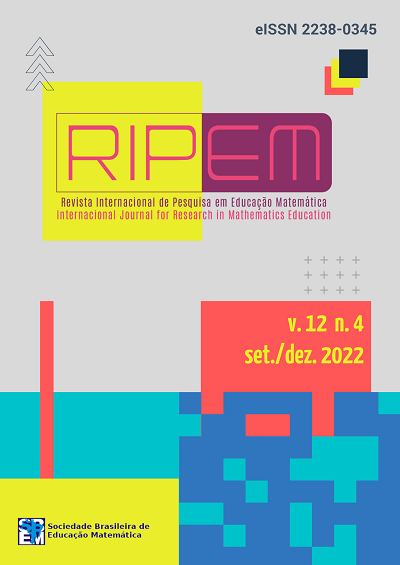Knowledge and beliefs manifested by teachers who teach Mathematics and make use of manipulative materials in their practices
DOI:
https://doi.org/10.37001/ripem.v12i4.3231Keywords:
Beliefs, Mathematics Teacher Training, Lesson StudyAbstract
The present text aims to highlight the knowledge and beliefs manifested by teachers who teach mathematics in the Interdisciplinary Cycle by making use of manipulable resources, in their interactions with documents and curriculum materials from the Municipal Network of São Paulo. To analyze the knowledge of teachers to teach Mathematics, we use a qualitative approach and data triangulation strategy typology and we rely on theories that discuss the knowledge of teachers who teach Mathematics, such as Ball, Tames & Phelps (2008). The results show that, in the training actions, some teachers' beliefs regarding the use of manipulative materials in the classroom were revealed. During the training, many of these beliefs were problematized and the reflection stage provided their resignification. However, beliefs are not easily overcome and therefore still need to be the object of reflection in teacher training courses that teach Mathematics.
Downloads
References
Ball, D. L.; Thames, M. H. & Phelps, G. (2008). Content Knowledge for Teaching: What Makes It Special? In: National Symposiun on Professional Development for Engineering and Technology Education. Illinois StateUniversity.
Curi (comp.). (2019). O Ensino de Matemática em questão: apontamentos para discussão e implementação do currÃculo da cidade. DisponÃvel em: http://portal.sme.prefeitura.sp.gov.br/Portals/1/Files/53083.pdf?fbclid=IwAR1AU3hi_aI_1h1Sr1yEBvA6vcA9sxwcVBnFLRbia53dk1FWUYntXLjzmOI. Acesso em: 10 out. 2019.
Curi, E. & Martins, P. B. (2018). Contribuições e desafios de um projeto de pesquisa que envolve grupos colaborativos e a metodologia Lesson Study. Revista Brasileira de Ensino de Ciências e Tecnologia, 11(2), 268-287.
Curi. (2004). Formação de professores polivalentes: uma análise de conhecimentos para ensinar matemática e de crenças e atitudes que interferem na constituição desses conhecimentos. Tese (Doutorado em Educação Matemática. PontifÃcia Universidade Católica de São Paulo. São Paulo, SP.
Curi. (2005). A Matemática e os professores dos anos iniciais. São Paulo: Musa Editora.
Curi. (2018). Reflexões sobre um Projeto de Pesquisa que envolve grupos colaborativos e a metodologia Lesson Study. In: E. Curi; J. C. P. Nascimento & J. P. Vece (Org.). Grupos Colaborativos e Lesson Study: contribuições para a melhoria do ensino de Matemática e desenvolvimento profissional de professores (pp.17-33). São Paulo, SP: Alexa Cultural.
Curi. (comp.). (2020). A metodologia Estudos de Aula na formação de professores que ensinam Matemática: aspectos metodológicos, potencialidades e desafios. DisponÃvel em: http://portal.sme.prefeitura.sp.gov.br/Portals/1/Files/53083.pdf?fbclid=IwAR1AU3hi_aI_1h1Sr1yEBvA6vcA9sxwcVBnFLRbia53dk1FWUYntXLjzmOI. Acesso em: 12 março. 2020.
Denzin, N. K. & Lincoln, Y. S. (2006). O planejamento da pesquisa qualitativa: teorias e abordagens. (2. Ed). Porto Alegre, RS: Artmed.
Gómez Chacón, I. M.; Op’t Eynde, P. & Corte, E. (2006). Creencias de los estudiantes de matemáticas: la influencia del contexto de clase. Enseñanza de las Ciencias, 24(3), 309-324.
Gómez-Chacón, I. (2003). Matemática emocional: os afetos na aprendizagem Matemática. Tradução de D. V. Moraes & K. C. S. Smole. Porto Alegre, SP: Artmed.
Lerner, D. (1992). Matemática na escola: aqui e agora. Porto Alegre, RS: Artes Médicas.
Machado, N. J. (2011). Matemática e lÃngua materna: análise de uma impregnação mútua. (6. ed.). São Paulo, SP: Cortez.
Martins, P. B. (2020). Potencialidades dos estudos de aula para a formação continuada de um grupo de professores que ensinam matemática na rede municipal de São Paulo no contexto de uma pesquisa envolvendo implementação curricular. 251f. Tese (Doutorado em Ensino de Ciências e Matemática). Universidade Cruzeiro do Sul. São Paulo, SP.
Pires, C. M. C. (2012). Reflexões que precisam ser feitas sobre o uso dos chamados materiais concretos para a aprendizagem em Matemática. Boletim GEPEM, 61, 1-17.
Ponte, J. P. (1992). Concepções de professores de Matemática e processos de formação. In: J. P. Ponte (Ed.). Educação Matemática: temas de investigação (pp.185-239). Lisboa, PT: Instituto de Inovação Educacional.
Ponte, J. P. (2012). Aprendizagens profissionais dos professores através dos estudos de aula. Perspectivas da Educação Matemática, 5, 7-24.
São Paulo (2017). Secretaria Municipal de Educação. Coordenadoria Pedagógica. CurrÃculo da Cidade: Ensino Fundamental: Matemática. São Paulo, SP: SME/COPED.
São Paulo (2017). Secretaria Municipal de Educação. Coordenadoria Pedagógica. CurrÃculo da Cidade: Ensino Fundamental: Matemática. São Paulo, SP: SME/COPED.
São Paulo (2018). Secretaria Municipal de Educação. Coordenadoria Pedagógica. Orientações Didáticas do CurrÃculo da Cidade: Matemática (Vol. 1). São Paulo, SP: SME/COPED.
São Paulo (2018). Secretaria Municipal de Educação. Coordenadoria Pedagógica. Orientações Didáticas do CurrÃculo da Cidade: Matemática (Vol. 2). São Paulo, SP: SME/COPED.
São Paulo (2019). Secretaria Municipal de Educação. Coordenadoria Pedagógica. Caderno da Cidade Saberes e Aprendizagens: Matemática (Vol. único, versão estudante). São Paulo, SP: SME/COPED.
São Paulo (2019). Secretaria Municipal de Educação. Coordenadoria Pedagógica. Caderno da Cidade Saberes e Aprendizagens: Matemática (Vol. único, versão professor). São Paulo, SP: SME/COPED.
Shulman, L. (1986). Those who understand: knowledge growth in teaching. Educational Research, 15(2), 4-14.
Shulman, L. (1987). Knowledge and teaching: foundations of the new reform. Harvard Educational Review, 57, 1-22.
Thompon, A. G. (1992). Teachers’ beliefs and conceptions: a synthesis of the research. In: D. A. Grouws. (Org.). Handbook of research on Mathematics teaching and learning (pp. 127-146). New York: Macmillan Publishing Company.
Vila, A. & Callejo, M. L. (2006). Matemática para aprender a pensar: o papel das crenças na resolução de problemas. Porto Alegre, RS: Artmed.
Published
How to Cite
Issue
Section

This work is licensed under a Creative Commons Attribution-NonCommercial-ShareAlike 4.0 International License.








